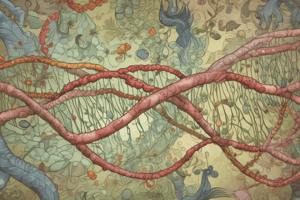Podcast
Questions and Answers
What type of inheritance is characterized by a single mutated gene copy being enough for the trait to manifest?
What type of inheritance is characterized by a single mutated gene copy being enough for the trait to manifest?
- Autosomal Dominant (correct)
- X-Linked Recessive
- X-Linked Dominant
- Autosomal Recessive
In X-Linked Recessive inheritance, affected males inherit the condition from their ___.
In X-Linked Recessive inheritance, affected males inherit the condition from their ___.
- Both parents
- Siblings
- Fathers
- Mothers (correct)
Which type of inheritance requires both parents to pass on the mutated gene for the trait to manifest?
Which type of inheritance requires both parents to pass on the mutated gene for the trait to manifest?
- X-Linked Dominant
- Autosomal Recessive (correct)
- Autosomal Dominant
- Polygenic
If a trait is controlled by a single gene and follows predictable patterns based on the inheritance of alleles, it is likely an example of ___ inheritance.
If a trait is controlled by a single gene and follows predictable patterns based on the inheritance of alleles, it is likely an example of ___ inheritance.
Which type of inheritance results in more females being affected compared to males due to females having two copies of the relevant chromosome?
Which type of inheritance results in more females being affected compared to males due to females having two copies of the relevant chromosome?
What term refers to the type of inheritance where both copies of the mutated gene must be present for the trait to manifest?
What term refers to the type of inheritance where both copies of the mutated gene must be present for the trait to manifest?
Which of the following is an example of incomplete dominance?
Which of the following is an example of incomplete dominance?
What type of inheritance pattern is exhibited by traits like height and weight in humans?
What type of inheritance pattern is exhibited by traits like height and weight in humans?
Which of the following statements about sex-linked inheritance is correct?
Which of the following statements about sex-linked inheritance is correct?
What is the term used to describe a single gene affecting multiple traits?
What is the term used to describe a single gene affecting multiple traits?
Which of the following inheritance patterns does not follow Mendel's laws?
Which of the following inheritance patterns does not follow Mendel's laws?
In which type of inheritance pattern do both alleles contribute equally to the phenotype?
In which type of inheritance pattern do both alleles contribute equally to the phenotype?
Flashcards are hidden until you start studying
Study Notes
Patterns of Inheritance: Mendelian, Non-Mendelian, Sex-Linked, Autosomal, and Polygenic
Mendelian Inheritance
Gregor Mendel, in his groundbreaking studies on pea plants, identified four main patterns of inheritance: autosomal dominant, autosomal recessive, X-linked dominant, and X-linked recessive. In Mendelian inheritance, a trait is controlled by a single gene and follows predictable patterns based on the inheritance of alleles.
Autosomal Dominant
A single mutated gene copy is enough to determine the presence of a trait. Both parents have a chance to pass on the mutated gene. Common example: Huntington's disease.
Autosomal Recessive
Both parents must pass on the mutated gene for the trait to manifest. Parents are usually unaffected and carrying the mutated gene without symptoms. Common example: Cystic Fibrosis.
X-Linked Dominant
One mutated gene copy is enough for the trait to manifest in all affected individuals. Women are more commonly affected since they have two copies of the X chromosome compared to men who have only one. Examples include hypophosphatemic rickets (vitamin D-resistant rickets) and ornithine transcarbamylase deficiency.
X-Linked Recessive
Both copies of the mutated gene must be present for the trait to manifest. Affected males inherit the condition from their mothers since fathers can only pass on Y chromosomes to male offspring. Common example: Hemophilia A.
Non-Mendelian Inheritance
Some genetic conditions do not follow Mendel's laws due to various factors such as multiple alleles, incomplete dominance, co-dominance, pleiotropy, lethal alleles, sex linkage, and polygenic traits.
Multiple Alleles
Real populations often have more than two versions of a given gene. For example, ABO blood group system has three different alleles for each location at a locus.
Incomplete Dominance
Two alleles may produce an intermediate phenotype when both are present. Example: Snapdragon flowers where a cross between white and red homozygotes produces wavy, intermediate-colored flowers.
Co-Dominance
Neither allele is dominant over the other; both contribute to the phenotype. Example: Duodenal alkaline phosphatase enzyme activity follows this pattern.
Pleiotropy
Single genes affect multiple traits. Example: Sickle cell disease affects hemoglobin production and oxygen transport in addition to causing sickle cells.
Lethal Alles
Can never survive until developmentally advanced stages. For example, some mutations in the EGFR gene cause embryonic lethality.
Sex Linkage
Traits linked with the sex chromosomes (X and Y). Mutations in a single copy of the gene can lead to the disorder in females but not males. X-linked diseases are usually recessive but sometimes appear to be dominant because males are affected while females are carriers.
Polygenic Inheritance
Involves many genes contributing to a particular trait rather than just one gene or a pair of opposing alleles. This type of inheritance makes it difficult to predict outcomes based on individual parental genotypes alone.
A complex organism like humans exhibits continuous variation like height, weight, etc., which can't be explained by simple Mendelian patterns. Instead, these traits involve multiple genes and environmental interactions.
Studying That Suits You
Use AI to generate personalized quizzes and flashcards to suit your learning preferences.



